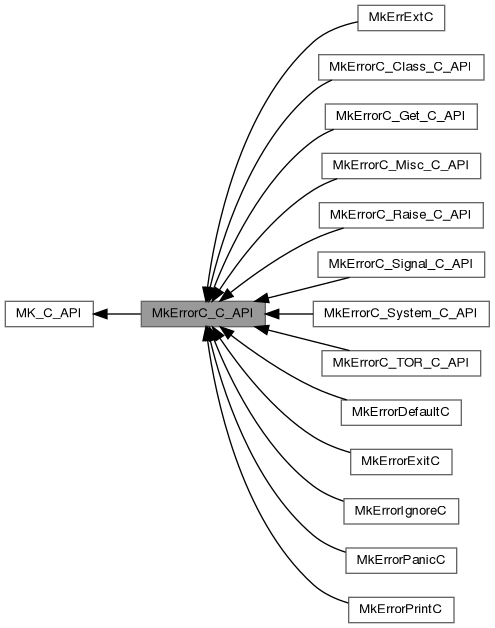MkErrorC - the class known as err or error is used to create and manage an error message … More...
 Collaboration diagram for MkErrorC_C_API:
Collaboration diagram for MkErrorC_C_API:Topics | |
| MkErrExtC | |
| MkErrExtS - extend the MkErrorC with a library specific feature … | |
| MkErrorPanicC | |
| signal-slot for panic on error … | |
| MkErrorIgnoreC | |
| signal-slot for ignore on error … | |
| MkErrorPrintC | |
| signal-slot for print on error … | |
| MkErrorExitC | |
| signal-slot for panic on error … | |
| MkErrorDefaultC | |
| signal-slot for raise an error … | |
| MkErrorC_Class_C_API | |
| MkErrorC - define the class … | |
| MkErrorC_TOR_C_API | |
| MkErrorC - various functions to 'create' and 'delete' a MkErrorS … | |
| MkErrorC_System_C_API | |
| MkErrorC - various functions to raise a 'System' messagen on MkErrorS … | |
| MkErrorC_Signal_C_API | |
| MkErrorC - various functions to set and check a 'signal' on a MkErrorS … | |
| MkErrorC_Get_C_API | |
| MkErrorC - various functions to 'get' data out of a MkErrorS … | |
| MkErrorC_Raise_C_API | |
| MkErrorC - various functions to 'raise' a MkErrorS … | |
| MkErrorC_Misc_C_API | |
| MkErrorC - various functions to 'work' on a MkErrorS … | |
Data Structures | |
| struct | MkErrorS |
| The data-type to store and handle the error-condition … More... | |
Macros | |
| #define | MkDbgErr_2(err, col) |
| #define | MkDbgErr(err) |
Detailed Description
MkErrorC - the class known as err or error is used to create and manage an error message …
An error is a singleton object per thread created at startup and is located at MkRuntimeRLS using the datatype MkErrorC.
As error-indicator the enum MkErrorE is used.
The MkErrorC is used to collect all data needed to handle an error and provide global ressources required to process and report the error.
The MkErrorC is also used to integrate the error-handling from atlmkkernel into the error-handling-code of the target Atl.
Example from Filter6.atl → use MqContextErrorCatch to convert a Atl error into a atlmkkernel error
MqMsgque::Main { set srv [MqFactoryC::New [MqFactoryC::Add ::Filter6]] try { MqContextC::LinkCreate $srv {*}$argv MqContextC::ProcessEvent $srv MQ_WAIT_FOREVER } on error {} { MqContextC::ErrorCatch $srv } finally { MqContextC::Exit $srv } }
MkExceptionC
MkExceptionC - The default-exception of the Programming-Language-Micro-Kernel (PLMK) …
The Programming-Language-Micro-Kernel (PLMK) provide with MkErrorC a complete error-handling with focus to support the "C" Programming-Language. The support include catch, raise, signal and attributes. In addition every Target-Programming-Language (TPL) add their own error-handling and the purpose of MkExceptionC is to integrate the MkErrorC into the Target-Programming-Language (TPL).
The default-exception MkExceptionC is used to connect the MkErrorC with the Target-Programming-Language (TPL) error-object.
- The default-error is defined in MkRuntimeS::error_mk.
- On error the default-error is set to the error-data, the MkErrorE status change to MK_ERROR.
- The non-C language create a copy from the default-error and throw the copy as MkExceptionC exception.
- The C language just return the MkErrorE status of the default-error.
The implementation of an exception depends heavily on the Target-Programming-Language (TPL), starting with no exception at all, for example. C, an exception as a class object, or as an exception as a global attribute.
- Attention
- All MkExceptionC code is implemented at the Target-Programming-Language (TPL) without support by the Programming-Language-Micro-Kernel (PLMK) compiler.
- By default, MkExceptionC is only used internally, hidden by the class MkErrorC.
ExceptionCheck
Checks if Exception is of type MkExceptionC and returns true or false …
Example: test case to check KILL and RECOVER feature, check on MkExceptionC
set VAL [ReadBUF $myNs] set cl [myooX::NewN ::Client] Client::myLinkCreate $cl [ConfigGetStartAs $myNs] Send $cl "W" "GPID@I" PID SysKill $myNs $PID 9 set RET 0 foreach num {1 2 3} { try { set RET [Send $cl "W" "ECOI:U@I" $VAL] } trap {MkExceptionC} "" { set err [ErrorCatch $cl] if {[MkErrorC::IsSOCKET $err]} { MkErrorC::Reset $err LinkConnect $cl continue } else { MkErrorC::Raise $err } myooX::DestroyN $err } break } SendSTART $myNs SendI32 $myNs $RET
- Returns
- the result of the check,
trueorfalse
- Parameters
-
[in] exception the exception object from Atl, if "MK_NULL"the global exception object is used
Macro Definition Documentation
◆ MkDbgErr
| #define MkDbgErr | ( | err | ) |
Definition at line 9696 of file LibMkKernel_mk.h.
◆ MkDbgErr_2
| #define MkDbgErr_2 | ( | err, | |
| col ) |
Definition at line 9693 of file LibMkKernel_mk.h.
Generated on Thu May 29 2025 13:13:26 for theKernel by
